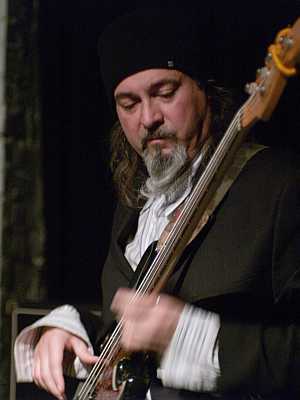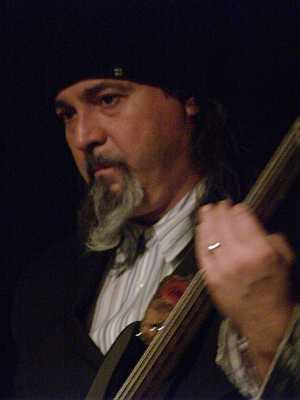Bill Laswell's Method of Defiance
Acclaimed bassist Bill Laswell has his own way of making music, and these days it involves some serious drum and bass. One performance, and a life's work.
Tonight, I’m just one of many fans jammed into The Stone, composer John Zorn’s new performance space, to see a series of drum-and-bass concerts featuring Bill Laswell, who easily is one of the world’s most talented electric bassists and music producers. The Stone is New York City’s best-kept music secret—where else could I see Laswell perform for the price of a movie ticket? The program, “Six Nights of Iconoclast Drum ‘n’ Bass,” promises something special, given Laswell’s insurmountable impact on the global soundscape—from his contributions to improvised jazz and collaborations with African musicians to his production work on albums by Yoko Ono, Mick Jagger, and Herbie Hancock. Although drum-and-bass music has been dismissed by some critics as repetitious and dull, Laswell persistently attacks the genre’s limitations with smoldering bass runs that compete aggressively with the corresponding beats and electronic instrumentation, challenging those with whom he is playing for the duration of every song.
Born in Salem, Ill., and raised in small Michigan towns, in the fall of 1976 Laswell packed up his bass and moved to New York City, where he soon became a part of Manhattan’s downtown music scene. With keyboardist Michael Beinhorn and drummer Fred Maher, Laswell formed Zu Band, which later morphed into Material, an outfit best known for its experimental boldness and recordings with such artists as free-jazz saxophonist Archie Shepp and pop singers Whitney Houston and Nona Hendryx.
Tonight’s show features Method of Defiance, a trio that comprises Laswell on bass, drummer Guy Licata, and Submerged, an electronic artist from Brooklyn. Also on stage for the evening is cornet player Graham Haynes (the son of drummer Roy Haynes), who has worked and performed with Laswell for many years.

At the beginning of the first set, behind his drum kit, Licata establishes a hypnotic foundation of breakbeats as Submerged applies a mixture of jazzy samples and ambient loops—a complex juxtaposition of cut-up rhythms and rapid-fire drumming timed so perfectly that someone listening to an audio recording would swear that Licata’s beats were programmed. Then Laswell plugs in with a series of silky, effortless runs up and down the fretboard at frequencies so low that his bass lines aren’t merely heard but are also felt in intense, gut-rumbling waves. Surrounded by pedals and effects boxes, Laswell tirelessly experiments with filters, reverberation techniques, and styles so varied they resemble everything from free-form jazz guitar to crunchy metal-chord progressions.
“Bill’s bass is like one big oscillator running though a web of modulation matrices,” Licata explains between sets. “And we’re all reacting to whatever we throw at one another. It’s like we’re turning our brains into sequencers. And the fact that we’re humans means that our responses will differ at each performance.”
Submerged, also known as Kurt Gluck, has recorded a drum-and-bass album with Laswell called Brutal Calling. He uses two computer programs—Logic and Ableton Live—to weave together the extraordinarily complex electronic textures that fill each piece.
His bass lines aren’t merely heard but are also felt in intense, gut-rumbling waves.
“I select small samples, cut them up, and program the bits into longer pieces,” Submerged explains. “It’s intense, time-consuming nerd work.”
The music is entirely improvised; the performances, riveting and otherworldly. And both 45-minute sets produce endless surprises as Haynes cushions the trio’s often-abrasive interplay with soft tones on his cornet. Haynes periodically samples some of his own melodies and then plays them back while adding additional live cornet to the loops. Sometimes he sounds like an entire horn section; at other moments, he resembles a pair of competing soloists. It’s sonic anarchy.
In the early ‘80s, Laswell took an interest in a unique style of music emerging from the South Bronx—what would later become known as hip-hop. The percussive scratching of records that is so integral to hip-hop was first introduced to the mainstream on Herbie Hancock’s Future Shock, an album Laswell produced. Although these performers are often referred to as DJs, Laswell sees them as artists in their own right, each with a distinctly different style.
“A DJ is a disk jockey—someone who spins records,” Laswell tells me after one of the performances at The Stone. “Turntablism is something different. The turntablists actually play the turntable as a percussion instrument.” Laswell has worked with a number of turntablists throughout his career, most notably with Grand Mixer D.S.T. on Hancock’s 1983 smash-hit single “Rockit.” Charged, one of Laswell’s experimental-fusion ensembles, also relies heavily on scratching in its live performances.
In 1984 Laswell produced “World Destruction,” a single that combined the vocals of hip-hop pioneer Afrika Bambaataa with the sarcastic snarls of former Sex Pistol John Lydon. This tendency to combine ostensibly opposing influences is a Laswell trademark and brings me to ask: Is Laswell making a conscious effort to mix genres, or does he simply ignore musical boundaries altogether?

“I’d go with the latter,” he says. “I think it has more to do with bringing musically diverse people together at a particular point in time.”
So was uniting two diverse cultural icons like Bambaataa and Lydon an experiment to see what would happen?
Seated in a cushioned chair in the basement of The Stone, Laswell pauses a moment to ponder the question. Polite and soft-spoken, he is nevertheless an imposing figure, dressed in black, his shoulder-length hair protruding from beneath a knit cap.
“No, Bambaataa called me and said he wanted to do a song with the lead singer for Def Leppard,” Laswell replies with a wry grin. “I told him I didn’t know the singer for Def Leppard, but I knew John Lydon. So the request to do [the record] actually came from Bambaataa.”
“World Destruction,” composed by Laswell and Bambaataa, addresses issues such as genocide, economic disparity, racism, nuclear war, and the stultifying influences of American media culture—social and political themes that reappear in Laswell’s collaborations with other artists such as the late Nigerian composer Fela Kuti, the Last Poets, and Praxis, a metal-fusion consortium that often includes former Parliament/Funkadelic members Bootsy Collins and Bernie Worrell.
Right now, Laswell is juggling a number of projects. A soon-to-be released Praxis album, Profanation, features Killah Priest of the Wu-Tang Clan and Serj Tankian, the lead singer for metal band System of a Down. With Zorn and rock vocalist Mike Patton (Faith No More, Mr. Bungle), Laswell also has recorded a benefit album for The Stone. But he seems as excited by upcoming live performances as he does about these studio undertakings.
“Lately I’m open to creating groups for festivals. Not necessarily fixed groups,” he says. “And I’m going to continue developing the drum-and-bass thing, too.”
With so many achievements in his lifetime of work, it’s now time to record them all for posterity’s sake. Music journalist Tom Bojko, currently on the road with Laswell, is doing just that, tenaciously resolving biographical and discographical discrepancies in his research for Destroy All Rational Thought: The Life and Music of Bill Laswell.
